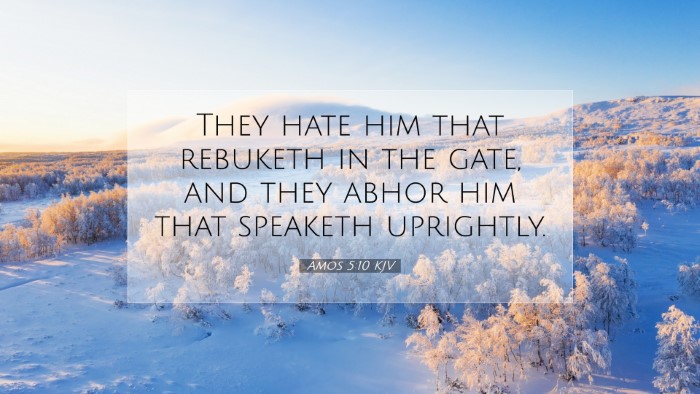Old Testament
Genesis Exodus Leviticus Numbers Deuteronomy Joshua Judges Ruth 1 Samuel 2 Samuel 1 Kings 2 Kings 1 Chronicles 2 Chronicles Ezra Nehemiah Esther Job Psalms Proverbs Ecclesiastes Song of Solomon Isaiah Jeremiah Lamentations Ezekiel Daniel Hosea Joel Amos Obadiah Jonah Micah Nahum Habakkuk Zephaniah Haggai Zechariah MalachiAmos 5:10
Amos 5:10 KJV
They hate him that rebuketh in the gate, and they abhor him that speaketh uprightly.
Amos 5:10 Bible Commentary
Amos 5:10 Commentary
Bible Verse: "They hate him that rebuketh in the gate, and they abhor him that speaketh uprightly." (Amos 5:10 KJV)
Introduction
The message of Amos is one of vigor and urgency, targeting social injustices and moral decay among the Israelites. Amos 5:10 encapsulates a critical aspect of this prophetic call—a manifestation of societal rejection towards righteousness. This commentary aims to delve into the richness of this verse using insights derived from various public domain commentaries.
Contextual Overview
Amos, a shepherd from Tekoa, was called by God to proclaim judgment against Israel for its sins. In this chapter, he contrasts true worship and the perversion of justice prevalent among the people. Amos 5:10 serves as a reflection of the hostility faced by those who dare to confront moral failures and advocate for truth.
Exegetical Analysis
In Amos 5:10, the verb "hate" suggests a deep-seated aversion to those who speak the truth. This theme resonates throughout the prophetic literature, highlighting the oft-unpleasant nature of divine rebuke.
- “They hate him that rebuketh in the gate” - The "gate" signifies a place of authority, judgment, and community discourse. To rebuke in the gate indicates a public call to justice where leaders and citizens often convened.
- “and they abhor him that speaketh uprightly” - The term "abhor" goes beyond mere dislike; it signifies a visceral rejection of those who embody integrity and moral uprightness. This illustrates a societal ethos that favours complacency over accountability.
Theological Implications
This passage raises important theological reflections on the nature of truth and its reception. In examining the motivations behind the disdain for the prophetical voice, we recognize the consequences of a society that prefers silence over reproof.
- Rejection of Prophetic Voice - As noted by Matthew Henry, the prophets, like Amos, represent God's voice, and their rejection is indicative of a broader spiritual bankruptcy.
- Moral Responsibility - The scorn for the "uprightly" indicates a neglect of moral duties, presenting a challenge to modern believers about their response to social justice issues.
- Fear of Exposure - Albert Barnes indicates that truth often exposes hidden sins, leading to an antagonistic response from those unwilling to confront their shortcomings.
Social Commentary
Understanding Amos 5:10 also requires us to consider the social dynamics at play. The hatred for those who speak out is often reflective of a power struggle where the status quo seeks to maintain control.
- Oppression of the Righteous - Adam Clarke notes that a society which fails to punish wrongdoing inadvertently empowers the oppressor. This status results in a climate where the righteous become targets.
- Silencing Truth - The passage warns against the societal tendency to silence dissenting voices, highlighting a critical need for support and encouragement of those who advocate for justice.
Practical Applications
Reflecting on Amos 5:10 provides practical guidance for believers and leaders today. The verse exhorts the Church to stand firmly for truth and grapple with the cultural pushback that often accompanies such a stance.
- Embrace Truth-telling - Believers are encouraged to follow the example of the prophets, embodying the courage to speak truth amidst societal pressures.
- Foster a Culture of Openness - Creating communities that value accountability and moral clarity mitigates the resistance encountered by those who uphold righteousness.
- Prepare for Resistance - Acknowledge that speaking the truth may lead to misunderstanding and rejection, and be prepared spiritually and emotionally to face such challenges.
Conclusion
Amos 5:10 serves as a poignant reminder of the complexities surrounding the proclamation of truth. It illustrates the tension between societal norms and divine righteousness, embodying the struggles of prophets and believers alike. As pastors, students, theologians, and scholars reflect on this verse, may it inspire a greater commitment to justice, truth, and the courage to navigate the challenges that arise in standing for what is right.


